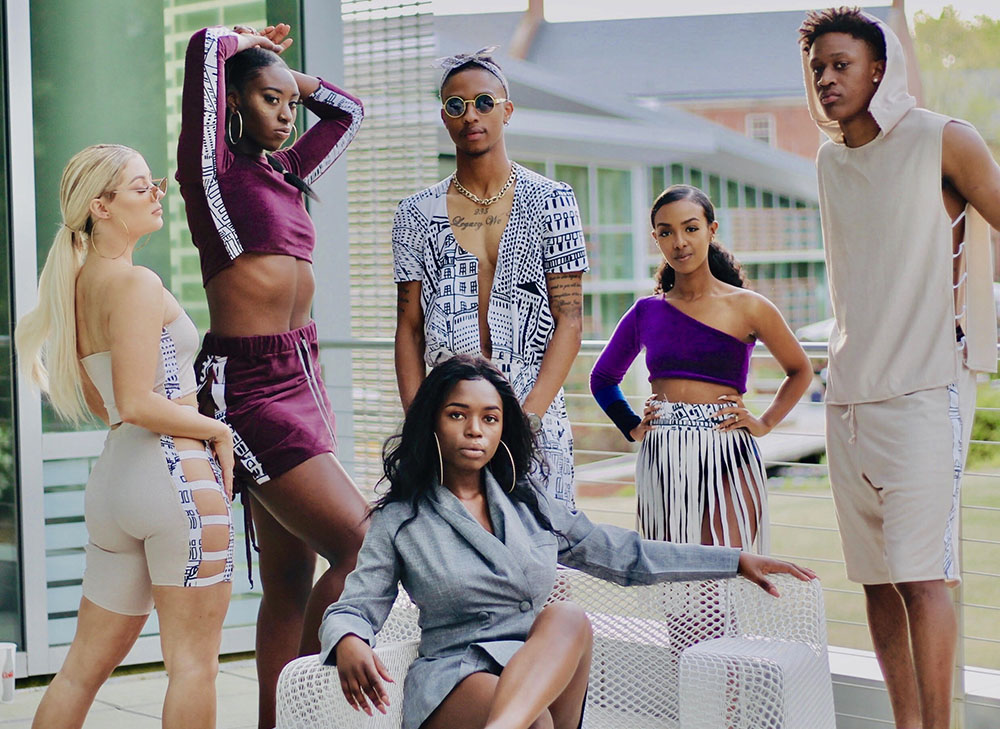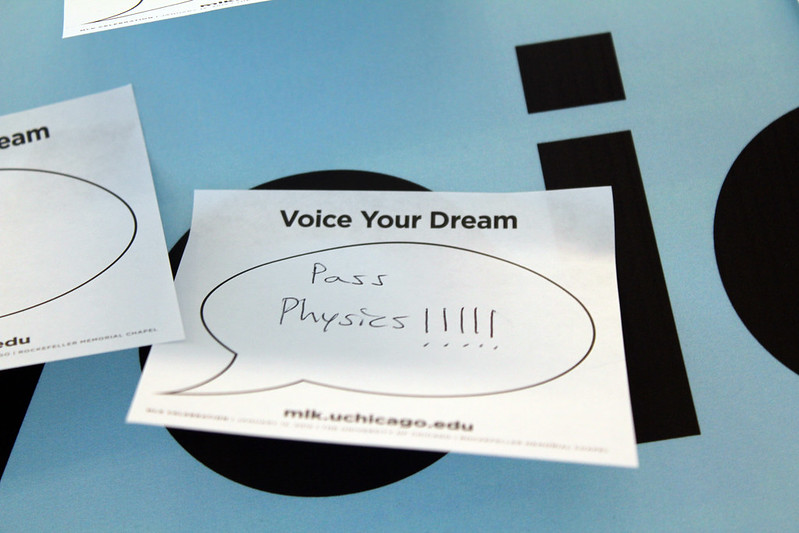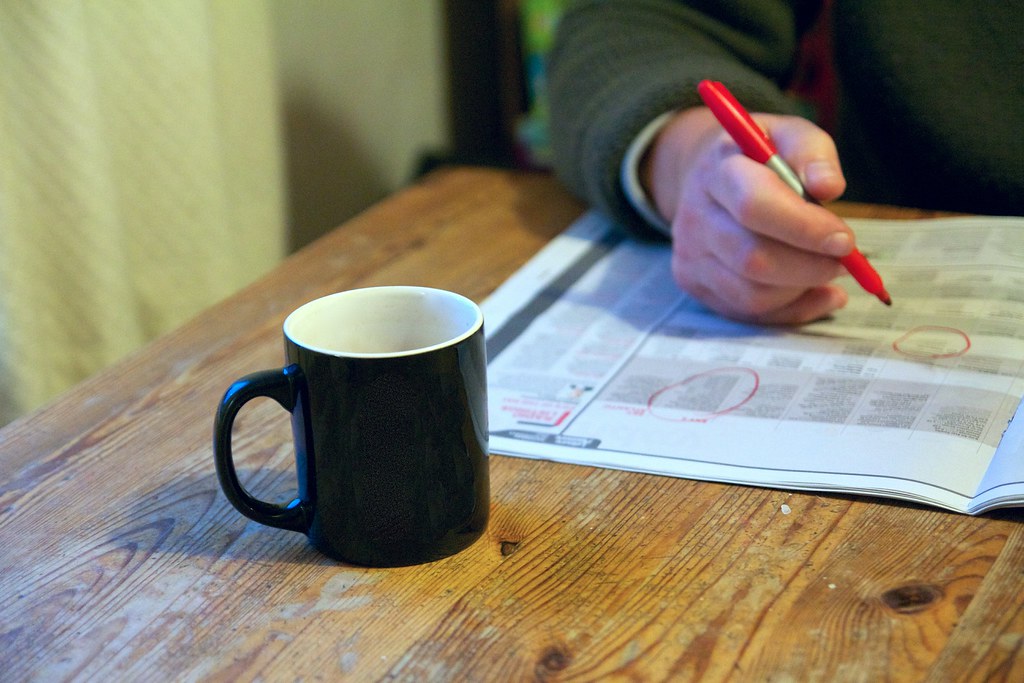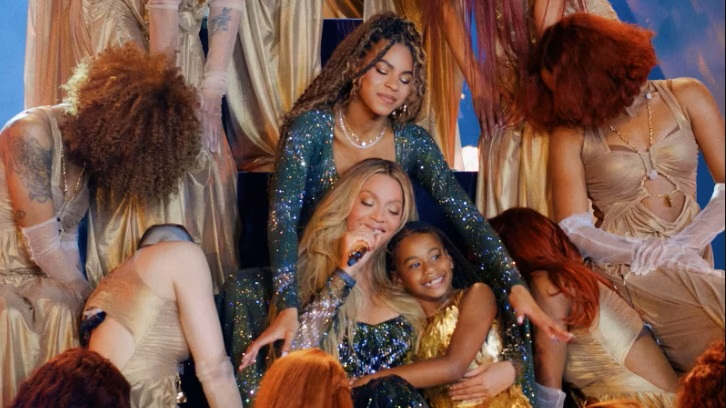Contributed by Angel Parpard-Jacke & Christina Pak Murashov/Angel Parpard-Jacke, a fourth-year studying political science, poses surrounded by models wearing ensembles of her line, “Athlead.”
Kennysha Woods | Managing Editor
The 22nd Annual Fashion Exposé was presented by the African-American Textile Society (AATS) on Thursday, Apr. 11 in Talley Student Union. Designers were curated from all over campus to showcase their original fashion lines.
The Nubian Message sat down with three designers of color to discuss their experiences with fashion: Angel Parpard-Jacke, a fourth-year studying political science, Amber Winstead, a second-year studying fashion and textile design, and Deja Herelle, a first-year studying fashion and textile design.
NM: How did you initially become interested in fashion?
Herelle: I was always interested in fashion when I was a little girl. I took a sewing class in middle school… and then I kind of fell off because I was trying to explore other majors. But I still found my way back to fashion.
Winstead: My aunt sewed, and one of my cousins was really interested in fashion. I spent a lot of time around her. I think that’s what got me really interested in sewing and making my own clothes.
Parpard-Jacke: I started sewing around September or October, and it really took off. I would post some of my beginner things, and my friends were like, “Oh my god, make more stuff.” So then I’d go to thrift stores and buy things and make them into new things. I started off doing that, and I was getting a lot of motivation.
NM: What is your line and what inspires it?
Herelle: It’s titled “Untitled.” Actually, one of the three part projects we’re doing now in my studio class, we were assigned artists at the North Carolina Art Museum downtown. I got assigned an African-American muralist named John T. Biggers and I fell in love with a painting… he did titled, “Untitled.” So I used that for my collection as well.
Winstead: “Bless the Night” is basically about a human fear of darkness. I had been talking about doing something like this for a while because I like talking about controversial topics–mostly colorism… I wanted to go off that idea.
Parpard-Jacke: The name is “Athlead”. It’s athletic-inspired clothing. I was saying “athlete,” and sometimes I have a little bit of a lisp because of my gap, so it came out as “athlead,” and I said, “Oh, this works!” Then when you think about it, athletes are like leaders in our communities. We all look up to them.
NM: What kind of work went into putting it all together? How did your idea translate or develop into reality?
Herelle: From when I first taught myself, and I still use this method now, taking clothes that I have, putting it on fabric, tracing my clothing and doing it from there. I’ll draw out things and it doesn’t always turn out that way, but everything still came out decent from my drawings. I’m working off basic patterns still and taking clothes I already own and transforming them…
Winstead: Picking the fabrics like the leather was a big part of it… Trying to make sure everything fit so that while it was something out there and you’ve never seen it before, it was still appealing to the eye. The nature of the leather I used was interesting to work with and I had to make some sacrifices with that.
Parpard-Jacke: I knew I didn’t have a lot to spend on mine. I just went to Reconsidered Goods, which is like a thrift store but for arts and crafts. So I went there and purchased [any fabrics I liked]. I was trying to think like, “How can I get 5 outfits out of this?” That’s where a lot of creativity came from. If I messed up, I couldn’t just go out and buy more since it’s all from a thrift store.
NM: Is there a certain message you try to communicate with your line? When people see it, what do you want them to think or feel?
Herelle: Self-expression. I’ve always been kind of business-like, but at the same time, I like a touch flashy things… When people first meet me, they think, “Oh, she’s definitely an introvert.” So I always want something flashy because that reflects my personality.
Winstead: I feel like so many times, we see or communicate darkness as ugly or connected to negative things like death. I wanted it to be overwhelming and just beautiful in how nice it was and how feminine it was. So many times in our culture, we associate darkness with awful things, that we then translate that onto people.
Parpard-Jacke: I was also really focused on creating things that the average person could wear. When I was working with my models, I wanted to make sure they felt like, “Wow, I like this. I can rock this.” That translated when they were walking.






